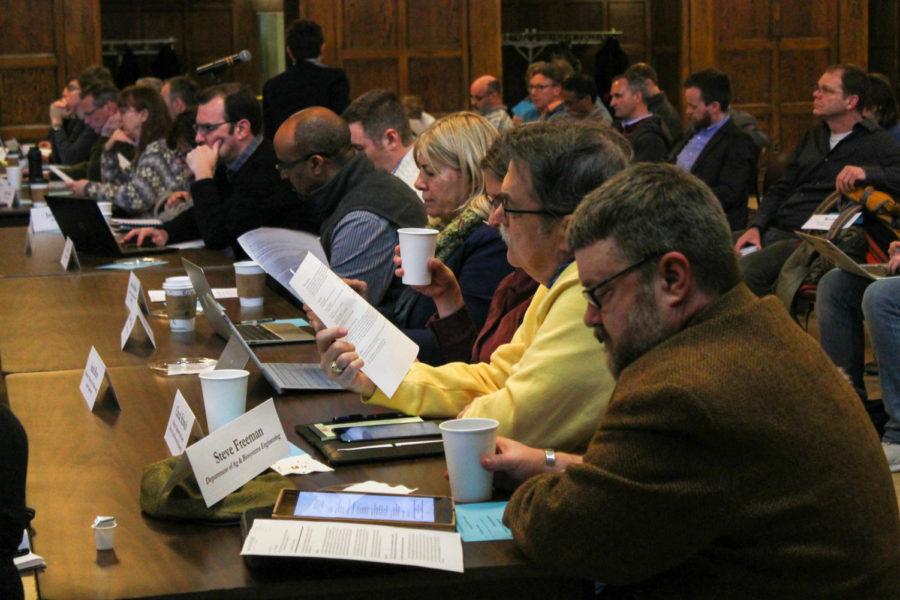- App Content
- App Content / News
- News
- News / Politics And Administration
- News / Politics And Administration / Campus
- News / Politics And Administration / City
Faculty senate addresses mid-year cuts, debates NTE reform
Members of the Faculty Senate listen during a senate meeting on April 3 in the Great Hall at the Memorial Union.
April 3, 2018
The Faculty Senate addressed NTE reform, mid-year budget cuts and additional programs of study in their bi-weekly meeting.
The meeting opened up with Vice President and Provost Jonathan Wickert talking about the mid-year cuts.
“After consulting with the Board of Regents, Iowa State will likely take a $5.4 million cut,” Wickert said.
Wickert continued that the brunt of those cuts, three quarters, would be cut centrally to absorb the damage to the academic affairs division of the college. In other words, Iowa State is doing all it can to make sure a quarter of the cuts will target student academics.
“Funding for 2019 isn’t clear,” Wickert said. “We will have to wait on further instruction from the legislature.”
Another item Wickert brought up was the current tuition proposals for 2019. The current proposal would increase resident undergraduate tuition by 3.8 percent and non-resident undergraduates or graduate students by 4 percent.
This would also coincide an increase in differential tuition in majors that are “high touch, high experiential.” This means that many majors that use labs in the College of Agriculture and Life Science, the College of Design, College Liberal Arts and Sciences and the College of Engineering will have higher tuition as a students credit classification goes up.
During the meeting they also approved the three programs of study mentioned in the last Faculty Senate meeting. These include a cyber security engineering major, an illustration minor and a certificate in actuarial science.
For the next Faculty Senate meeting, the Senate also proposed two new programs.
The first proposed program of study would be a graduate program for a doctorate of education, and the second program would be a graduate certificate in meat science.
The Faculty Senate then heard a proposal to add more excused absences for members of the military. The proposal would make military medical examinations, often placed months in advance, an excused absence as well as excusing ROTC military orders that can pop up at any moment.
The final thing discussed by the Faculty Senate was NTE reform.
NTE reform has been a goal of the Faculty Senate for some time now and there has been progress towards a common proposal.
In his opening comments, Faculty Senate President Tim Day mentioned that they know that they want to keep things simple but clarify the path of professors careers.
Their proposal thus far would simplify the career paths of professors to either a professor of teaching or a non-tenure eligible “term faculty member.”
The professor of teaching would then be broken into two more categories: professors of practice, meaning someone who is a professor based on their career accomplishments, and professors who teach because they have a doctorate or their field equivalent.
The proposed “term faculty members” would be similar to the current position of lecturer or senior lecturer.
The main issue that Faculty Senate members brought up was that the proposal had three levels of a professor of practice. Like the current system for normal professors, there would be an assistant, associate and full professor of practice.
This was a problem for some who said that it doesn’t make logical sense for there to be a scale; you are either practicing your area of expertise or you aren’t.
Supporters said that the scale is necessary for younger or mid-career professors who shouldn’t have the same classification as another, more experienced professor of practice.
Some even said that it shouldn’t be a decision of the Faculty Senate to begin with.
Sen. John Monroe, Associate Professor of History, said “it sounds to me like we are trying to tell every department how they should operate. We shouldn’t have a one size fits all approach, rather, we should let the departments decide if different levels of professor of practice should be implemented.”
The Faculty Senate seemed to be getting closer to a conclusion on NTE reform, but it is unlikely that the final decision will be to everyone’s liking.







